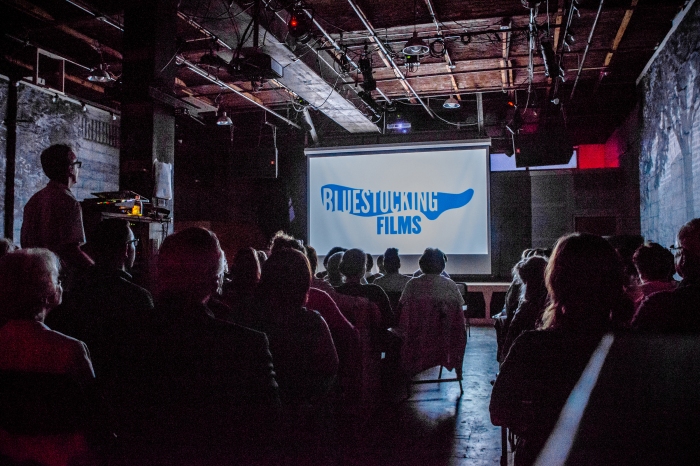Bluestocking Film Series celebrates and amplifies women’s voices and stories on-screen and promotes talented, emerging and established filmmakers who take the creative risk of placing female characters front and center. Founded in 2010, Bluestocking focuses exclusively on female-driven films that pass the Bechdel-Wallace Test (a film with at least two female characters speaking to each other about something other than men). The only women in film event in Maine, Bluestocking was also the first U.S. film event to receive Sweden’s A-Rating (informing consumers that the festival passes the Bechdel-Wallace Test).
Interview with Kate Kaminski
Matthew Toffolo: What is your Film Festival succeeding at doing for filmmakers?
Bluestocking Film Series is a dedicated space for celebrating films that center female characters. We have a vested interest in finding, promoting and nurturing those filmmakers we believe have the chops to succeed in the commercial marketplace, and to influence the future of female representation on-screen. Our relationships with filmmakers extend beyond the annual screenings and, after six years, we’ve connected to an incredibly diverse, global network of people committed to changing the ratio and making great movies.
MT: What would you expect to experience if you attend the festival this year (2016)?
This year is a total immersive experience of female-driven cinema in every genre. We’ve got wacko comedies, moving dramas, sharp satirical scifi and horror films, and road movies that radically reinterpret a narrative often exclusively male. And we’re also dubbing our 6th annual fest as The Year of The Bad Girls, so people can expect women behaving badly too.
MT: What are the qualifications for the selected films?
We specifically seek out well-produced films that offer an alternative, more complicated view of what women and girls are capable of. We’re always interested in seeing stories that offer insight into the complex relationships we have with each other. With our focus exclusively on fiction films, good acting is probably the most important qualification for any selected film.
MT: Do you think that some films really don’t get a fair shake from film festivals? And if so, why?
Considering that people pay for that consideration, film festivals, by definition, should be giving every filmmaker a fair shake. Does every programmer to an extent have their own taste that drives selection curation? Speaking for myself, yes. There are certain types of characters and situations that especially excite my interest, but I’m open to an extremely wide range of cinematic expression.
MT: What motivates you and your team to do this festival?
We’re driven by a desire to see (and nurture) films that provoke new thinking about the possibilities for female-driven stories. Bluestocking screenings are an exciting experience for the audience. We also feel like we’re part of the greater movement toward gender equality in the world of cinema and in general. Of course, we’re motivated by love of the art. Movies have the ability to transport audiences, move them emotionally, and even change them — which is the point of it all.
MT: How has the festival changed since its inception?
We started as a biannual showcase and have evolved into an annual celebration of female protagonists. We’re also expanding to 3 days of programming in 2016, opening the festival with an all-star panel of women in film talking about the state of female representation on- and off-screen. We remain committed to the art of the short film, but we are also open to the possibilities of eventually screening features and running a screenwriting competition.
MT: Where do you see the festival by 2020?
That will be Bluestocking’s 10th anniversary! Hopefully, by then, Bluestocking is a destination for film lovers who are as fascinated by complex female protagonists as we are, and they’re making an annual trek to see what cinematic riches we have in store for them.
MT: What film have you seen the most times in your life?
This is probably the hardest question of all! I’ve seen so many movies multiple times. If I’m pressed, I admit that I re-watch “Jaws” every year so it probably wins for most times. Plus, shark-driven films are perhaps my second favorite genre. But I’ve also watched (and taught) Barbara Loden’s film “Wanda” enough times that it’s a close second.
MT: In one sentence, what makes a great film?
My notion of a great film might be somebody else’s trash, but I know it when I see it.
MT: How is the film scene in your city?
I’ve been making films in Portland since the early 1990s when there were only a few of us, so I’ve seen the scene grow exponentially in the last 15-20 years. Now there’s a very active indie scene for sure. The beauty of being a low-budget, indie filmmaker in Portland (and Maine, in general) is that you really have your pick of locations. You can shoot urban or rural scenes, seaside or mountain, and do so with very little travel time. So that’s pretty sweet.

Kate Kaminski is an independent filmmaker whose films have screened all over the world. As Gitgo Productions, she and partner Betsy Carson have produced more than 30 films, including 4 feature films and numerous short fiction and non-fiction films. Gitgo’s 53-episode improvised Willard Beach was the first web series produced in Maine. In 2010, Kaminski founded the Bluestocking Film Series.
Interviewer Matthew Toffolo is currently the CEO of the WILDsound FEEDBACK Film & Writing Festival. The festival that showcases 10-20 screenplay and story readings performed by professional actors every month. And the FEEDBACK Monthly Festival held in downtown Toronto on the last Thursday of every single month. Go to www.wildsound.ca for more information and to submit your work to the festival.
Reblogged this on WILDsound Writing and Film Festival Review.
LikeLike
Reblogged this on WILDsound Writing and Film Festival Review.
LikeLike
Reblogged this on WILDsound Writing and Film Festival Review.
LikeLike
Reblogged this on WILDsound Writing and Film Festival Review.
LikeLike